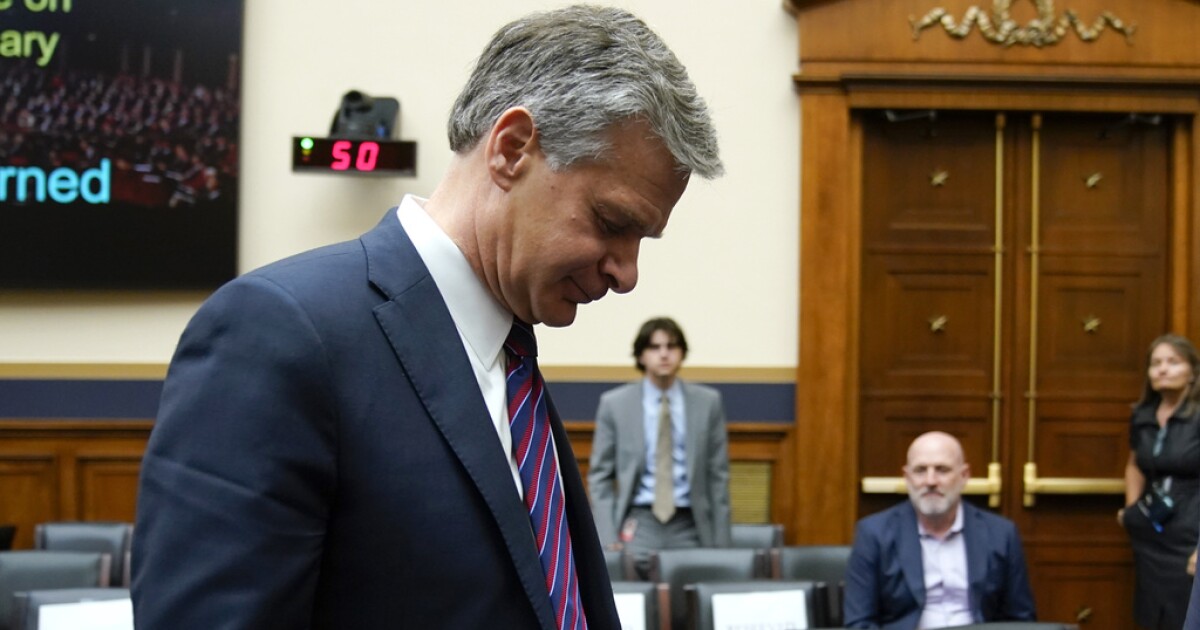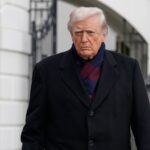

FBI Director Chris Wray spent more than five hours testifying before the House Judiciary Committee on Wednesday, but his appearance did little to assuage the concerns Republicans had going into the hearing.
Often avoiding direct answers, Wray deflected criticism of the bureau on everything from the Russia investigation to its treatment of anti-abortion activists.
WALL OF WASTE: CAN TRUMP’S SIGNATURE BORDER ISSUE DELIVER HIM A SECOND TERM?
Here are some of the top takeaways from the hearing.
SURVEILLANCE PROGRAMS ARE IN JEOPARDY
With a deadline looming at the end of the year for Congress to reauthorize a key surveillance program, lawmakers from both parties peppered Wray with questions about recent abuses of the system.
The bipartisan skepticism of the program, authorized by section 702 of the Foreign Intelligence Surveillance Act, suggests the FBI may have a difficult time convincing Congress to extend its powers,
Rep. Pramila Jayapal (D-WA), for example, questioned Wray about the purchase of Americans’ data and the use of surveillance tools, citing “civil liberties” concerns.
Jayapal warned that Wray likely faces “a difficult reauthorization process.”
Rep. Zoe Lofgren (D-CA) joined several Republicans in asking about a court’s recent finding that FBI agents conducted more than 200,000 illegal searches of surveillance databases for communications involving Americans.
FISA allows the FBI to conduct warrantless surveillance on foreigners, a process that can sometimes result in the collection of communications involving Americans if a foreigner under surveillance is sending messages to an American.
Searching the database of those communications for information only about Americans, and with no evidence of a crime or reason to suspect foreign contacts, is a violation of the section 702 rules.
Wray also faced questions about one of the most recent violations of FISA guidelines: the surveillance of a former Trump adviser during 2016 using faulty warrant applications.
RUSSIAGATE REPEAT?
Rep. Chip Roy (R-TX) grilled Wray about why an FBI agent cited for misconduct in the Russia investigation was permitted to perform high-level work on another politically sensitive investigation, this one involving the Biden family.
FBI supervisory intelligence agent Brian Auten was referred to the Office of Professional Responsibility, a Department of Justice unit that performs disciplinary reviews, for possible punishment after Auten was one of multiple agents found to have acted improperly in the 2019 DOJ inspector general report about the start of the Russia investigation.
Auten went on to shut down parts of the investigation into Hunter Biden’s business dealings in 2020. He falsely labeled some of the evidence against Biden as disinformation, slowing the investigation, according to FBI whistleblowers who spoke with Senate Republicans.
Wray refused to comment on Auten’s status, although he did acknowledge that the FBI agent is still under a disciplinary review.
“I can’t at the moment discuss a pending personnel matter,” Wray said.
“I can tell you that every employee that in any way touched the Crossfire Hurricane matter has been referred to our Office of Professional Responsibility,” Wray added, referring to the internal name the FBI gave to the Trump-Russia investigation.
The FBI director testified that former special counsel John Durham, who had been tasked with investigating the start of Crossfire Hurricane, had asked the FBI to slow down the disciplinary process while he investigated the agents involved. Now that Durham is done, Wray suggested, the disciplinary review can resume.
Whether Auten remains involved in a Biden investigation that, according to multiple IRS and FBI whistleblowers, has faced roadblocks for years remains unclear.
CORRECTING THE RECORD ON ABORTION VIOLENCE
Wray acknowledged that violence against anti-abortion facilities and crisis pregnancy centers has risen dramatically since the Supreme Court struck down Roe v. Wade last year, contradicting a Democratic talking point about the threat to pro-abortion organizations.
Rep. Deborah Ross (D-NC) focused her questioning on what the FBI was doing to protect abortion centers from what she claimed was a rise in violence against abortion providers.
Instead, Wray corrected her, noting that the FBI has actually seen a “significant uptick” in violence against “pro-life” centers.
“Most of the investigations,” he said, “probably about 70% of them,” have involved attacks on crisis pregnancy centers, not abortion clinics.
SOCIAL MEDIA CENSORSHIP IN SPOTLIGHT
Multiple Republicans focused their questioning on the FBI’s relationship with social media platforms, which has recently been the focus of a court case.
A judge ruled earlier this month that the Biden administration must cease communications with social media companies and said in an order that the federal government’s efforts to get content removed from social media platforms may have constituted a significant violation of free speech rights.
Wray denied that the bureau had done anything wrong.
“The FBI is not in the business of moderating content or causing any social media company to suppress or censor” content, Wray said.
While acknowledging that the FBI did, in some cases, flag content it wanted removed to employees at social media companies, Wray argued that the efforts didn’t constitute a free speech violation because social media companies could have chosen to disregard the FBI’s requests.
CATHOLIC TARGETING
Wray assured lawmakers the FBI will not target traditional Catholics after an uproar over a memo written by FBI officials in the Richmond, Virginia, field office.
He said the FBI was still reviewing how and why the memo was written in the first place.
The controversial document leaked in January, meaning the internal review has likely dragged on for at least six months.
Wray defended the FBI’s conduct during a related episode that Republicans have cited as evidence of the bureau’s bias against conservatives.
He declined to criticize the decision of Philadelphia FBI agents to arrest an anti-abortion activist, Mark Houck, at his home unannounced after Houck had offered to turn himself in on charges that critics said were overly harsh in the first place.
Houck was later acquitted by a jury.
Wray also refused to discuss why, after local authorities had found no evidence on which to charge Houck with a crime following the 2021 incident in question, the FBI had built its own case and arrested Houck a year later. Houck was charged under a federal law that deals with violence around reproductive health centers, although Houck maintained that he pushed a pro-abortion activist only after that activist screamed in the face of his 12-year-old son, who was with his father praying outside an abortion clinic.
NO WORD ON THE BIDEN INVESTIGATION
Wray offered virtually no insight into what the FBI is doing to investigate allegations of illegal foreign lobbying and money laundering by members of the Biden family, even as evidence of misconduct in that investigation mounts.
“I’m not going to confirm or speak to who is or isn’t under investigation,” Wray said when asked whether President Joe Biden is a subject of the investigation.
Contrary to what Hunter Biden’s lawyers have said publicly, however, Wray stated that the investigation into his activity is still open.
“As you may know, there is an ongoing investigation being led by the U.S. attorney in Delaware, Mr. [David] Weiss, appointed by President Trump in the last administration, that our Baltimore field office is working with,” Wray said.
Still, Wray did not address accusations that the bureau has declined to pursue leads related to the Biden family’s international business dealings.
JAN. 6 PLANTS?
Wray did not deny that the FBI may have had undercover agents or informants among the Jan. 6 rioters; he denied only that the violence at the Capitol occurred at the direction or incitement of the bureau.
Rep. Darrell Issa (R-CA) questioned Wray on whether the FBI had informants or agents who entered the Capitol building during the Jan. 6 riots.
“I really need to be careful here talking about where we have and have not used confidential human sources,” Wray said.
Wray said a court filing in one Jan. 6 case could provide information about how many FBI sources were among the crowd during the riots, but he declined to provide specific information.
The FBI director also rebuffed questions about a specific Jan. 6 protester, Ray Epps, who has been the focus in conservative media of scrutiny due to footage that captured him encouraging people to march toward the Capitol. Although hundreds of people who participated in the Jan. 6 riots have been arrested, Epps was not, sparking theories on the right that Epps was an FBI asset.
Epps has denied the accusation and this week sued Fox News for defamation for airing claims that he worked for the FBI.
Wray refused to answer questions about why, despite the footage of Epps encouraging the Jan. 6 protesters, he has not faced the same consequences as others.
STRONGEST SHADE SO FAR…
While Wray defended many of the controversial moves the FBI has made under his leadership, he still offered some of his harshest public criticisms to date of things the bureau has done.
“I consider the conduct that was described in the Durham report as totally unacceptable,” Wray said, going far further than the statement the FBI put out at the time Durham released his findings.
Wray also distanced the FBI from a memo one of its field offices wrote about ways to infiltrate the traditional Catholic community in search of illegal activity.
“I was aghast and ordered it removed from FBI systems,” he said of the memo. “That product is not something I will defend or excuse.”
…BUT STILL, FEW ANSWERS
Wray may have been critical of the Russia investigation and the anti-Catholic memo, but he still had few concrete answers as to what he’d done to fix the problems.
He refused to speak to whether Auten, who was deeply involved in the Russia investigation, remains on the Biden investigation.
And he deflected questions about who prepared the anti-Catholic memo and what the FBI has done to discipline the field office, citing an “internal review” that remains ongoing.
CLICK HERE TO READ MORE FROM THE WASHINGTON EXAMINER
Wray’s lack of defense of the way the bureau has handled the Biden family investigation stood in contrast to how strongly he defended the FBI on other fronts, including the aggression with which the FBI pursued former President Donald Trump in the classified documents case.
He deflected most questions about it, likely leaving Republicans unsatisfied with his testimony.





